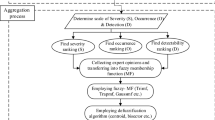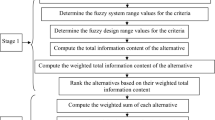Abstract
The failure mode, effect and criticality analysis (FMECA) is a famous bottom-up analytical method for quantifying and ranking critical failures of a product normally at its design stage. At present, as the importance of equipment maintenance increases in industry, FMECA is often applied in maintenance management. In practical cases, equipment is composed of different components, and its maintenance optimization should consider requirements of reliability, availability and costs together. This paper proposes the method called the extended failure mode, effect and criticality analysis (e-FMECA) for equipment maintenance management optimization on the basis of the FMECA theory. This method gives the procedure of analyzing the risks of different failure modes associated with reliability, availability and maintenance costs of equipment. In order to measure these risks of reliability, availability and maintenance costs quantitatively, a fuzzy risk priority method for e-FMECA is developed. Finally, the case study of the e-FMECA method in terms of metro rolling stocks is given. The proposed e-FMECA might be beneficial for selecting the maintenance strategies, maintenance polices and maintenance optimizing objects for maintenance management optimization.




Similar content being viewed by others
References
R. Dekker, Applications of maintenance optimization models: a review and analysis. Reliab. Eng. Syst. Saf. 51, 229–240 (1996)
M. Bevilacqua, M. Braglia, The analytic hierarchy process applied to maintenance strategy selection. Reliab. Eng. Syst. Saf. 70, 71–83 (2000)
L. Chang, L. Li, Study of Tianjin metro ticket pricing based on Ramsey pricing model. Railway Eng. Cost Manag. 22(6), 12–17 (2007). (in Chinese)
L. Bertling, R. Allan, R. Eriksson, A reliability-centered asset maintenance method for assessing the impact of maintenance in power distribution systems. IEEE Trans. Power Syst. 20(1), 75–82 (2005)
X. Jia, The decision models for reliability-centered maintenance (National Defense Industrial Press, Beijing, 2007). (in Chinese)
G. Carmignani, An integrated structural framework to cost-based FMECA: the priority-cost FMECA. Reliab. Eng. Syst. Saf. 94, 861–871 (2009)
N.R. Sankar, B.S. Prabhu, Modified approach for prioritization of failures in a system failure mode and effects analysis. Int. J. Qual. Reliab. Manag. 18(3), 324–335 (2001)
S.M. Seyed-Hosseini, N. Safaei, M.J. Asgharpour, Reprioritization of failures in a system failure mode and effects analysis by decision making trial and evaluation laboratory technique. Reliab. Eng. Syst. Saf. 91, 872–881 (2006)
F. Franceschini, M. Galetto, A new approach for evaluation of risk priorities of failure modes in FMEA. Int. J. Prod. Res. 39, 2991–3002 (2001)
J. Puente, R. Pino, P. Priore, D. de la Fuente, A decision support system for applying failure mode and effects analysis. Int. J. Qual. Reliab. Manag. 19, 137–150 (2002)
Y.S. Lee, D.J. Kim, J.O. Kim, H. Kim, New FMECA methodology using structural importance and fuzzy theory. IEEE Trans. Power Syst. 26(4), 2364–2370 (2011)
H. Li, C. Qiu, Application of fuzzy FMECA in analysis of hydraulic system reliability. Hydraul. Pneum. Seals 1, 38–42 (2012). (in Chinese)
M. Braglia, M. Frosolini, R. Montanari, Fuzzy criticality assessment model for failure modes and effects analysis. Int. J. Qual. Reliab. Manag. 20(4), 503–524 (2003)
Y.-M. Wang, K.-S. Chin, G.K.K. Poon, J.-B. Yang, Risk evaluation in failure mode and effects analysis using fuzzy weighted geometric mean. Expert Syst. Appl. 36, 1195–1207 (2009)
A.C. Kutlu, M. Ekmek Cioglu, Fuzzy failure modes and effects analysis by using fuzzy TOPSIS-based fuzzy AHP. Expert Syst. Appl. 39(1), 61–67 (2012)
L. Wang, J. Chu, J. Wu, Selection of optimum maintenance strategies based on a fuzzy analytic hierarchy process. Int. J. Prod. Econ. 104, 151–163 (2007)
J. Ran, The research of the rank of triangular fuzzy numbers. J. Cent. Univ. Natl. 20(4), 37–42 (2011). (in Chinese)
Acknowledgment
The research work described in this paper was supported by the Public Welfare Technology Application Research Project of Zhejiang Province Science and Technology Department (LGG18F030010), Research Project of Education Department of Zhejiang Province (Y201839978), and National Natural Science Foundation of China (Nos. 51504228, 51575503).
Author information
Authors and Affiliations
Corresponding author
Additional information
Publisher's Note
Springer Nature remains neutral with regard to jurisdictional claims in published maps and institutional affiliations.
Rights and permissions
About this article
Cite this article
Wang, L., Gao, Y., Xu, W. et al. An Extended FMECA Method and Its Fuzzy Assessment Model for Equipment Maintenance Management Optimization. J Fail. Anal. and Preven. 19, 350–360 (2019). https://doi.org/10.1007/s11668-019-00611-3
Received:
Revised:
Published:
Issue Date:
DOI: https://doi.org/10.1007/s11668-019-00611-3




